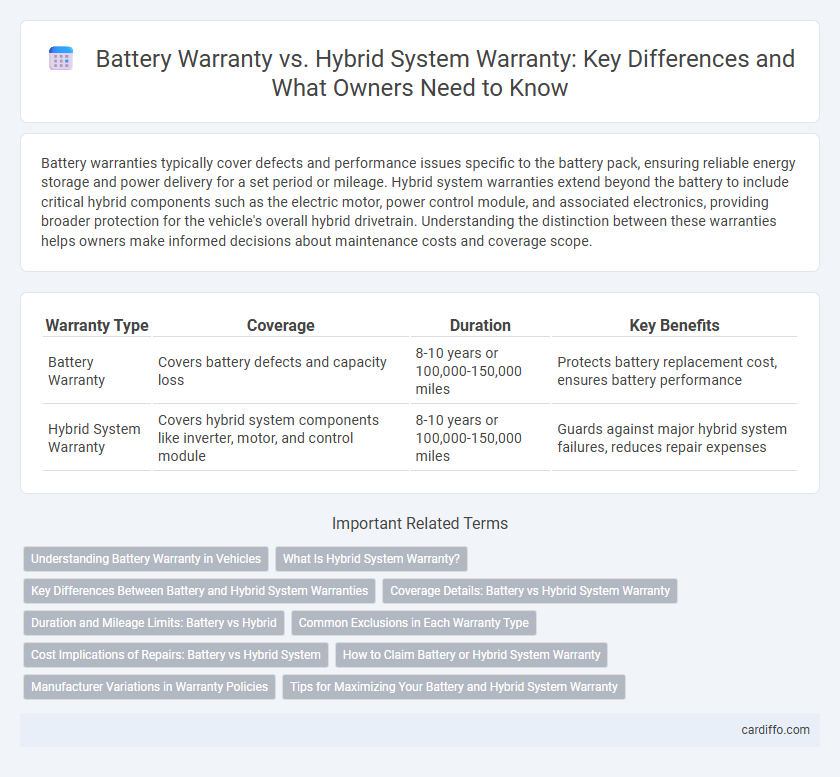Battery warranties typically cover defects and performance issues specific to the battery pack, ensuring reliable energy storage and power delivery for a set period or mileage. Hybrid system warranties extend beyond the battery to include critical hybrid components such as the electric motor, power control module, and associated electronics, providing broader protection for the vehicle's overall hybrid drivetrain. Understanding the distinction between these warranties helps owners make informed decisions about maintenance costs and coverage scope.
Table of Comparison
| Warranty Type | Coverage | Duration | Key Benefits |
|---|---|---|---|
| Battery Warranty | Covers battery defects and capacity loss | 8-10 years or 100,000-150,000 miles | Protects battery replacement cost, ensures battery performance |
| Hybrid System Warranty | Covers hybrid system components like inverter, motor, and control module | 8-10 years or 100,000-150,000 miles | Guards against major hybrid system failures, reduces repair expenses |
Understanding Battery Warranty in Vehicles
Battery warranty in vehicles typically covers defects and capacity degradation for a specified period, often 8 to 10 years or up to 100,000 miles, ensuring reliable energy storage and performance. Hybrid system warranties extend coverage to components such as the electric motor, inverter, and control modules, usually for a shorter duration or mileage. Understanding the battery warranty helps vehicle owners assess long-term ownership costs and maintain optimal hybrid system functionality.
What Is Hybrid System Warranty?
Hybrid System Warranty covers essential components of a vehicle's hybrid drivetrain, including the battery pack, inverter, electric motor, and related hybrid control modules. This warranty specifically addresses defects and failures in the hybrid electrical system, typically lasting 8 to 10 years or 100,000 to 150,000 miles. Unlike standard Battery Warranty, which primarily protects only the high-voltage battery against capacity loss or defects, the Hybrid System Warranty offers broader coverage for the entire hybrid propulsion system.
Key Differences Between Battery and Hybrid System Warranties
Battery warranty typically covers the rechargeable battery pack specifically designed to power the vehicle, often lasting 8-10 years or around 100,000 miles, ensuring protection against defects and capacity loss. Hybrid system warranty extends coverage beyond the battery to include related components such as the electric motor, power control module, and hybrid transmission, usually offering warranty periods similar to or slightly longer than the battery warranty. Understanding these distinctions helps consumers identify the scope of coverage and the parts protected under each warranty type, influencing maintenance and repair expectations.
Coverage Details: Battery vs Hybrid System Warranty
Battery warranty typically covers defects and capacity loss in the high-voltage battery pack for a specific period or mileage, often around 8 to 10 years or 100,000 miles. Hybrid system warranty extends coverage beyond the battery, including components like the electric motor, control modules, and powertrain elements, ensuring repair or replacement if any covered hybrid parts fail. Both warranties aim to protect critical hybrid vehicle components but vary in scope, with the hybrid system warranty offering broader protection encompassing mechanical and electronic hybrid components.
Duration and Mileage Limits: Battery vs Hybrid
Battery warranties typically cover 8 to 10 years or 100,000 to 150,000 miles, depending on the manufacturer and model. Hybrid system warranties often extend similar durations, generally 8 years or 100,000 miles, but some brands offer up to 150,000 miles for comprehensive hybrid component coverage. Understanding the specific warranty limits for both battery and hybrid systems is crucial to maximizing protection and avoiding unexpected repair costs.
Common Exclusions in Each Warranty Type
Battery warranty commonly excludes damage from improper maintenance, unauthorized repairs, and physical or water damage, limiting coverage primarily to capacity loss or manufacturing defects. Hybrid system warranty often excludes wear-and-tear parts such as belts and cooling system components, as well as faults caused by neglect, modifications, or accident-related damage. Understanding these common exclusions highlights the importance of following manufacturer guidelines to maintain warranty validity in both battery and hybrid system protections.
Cost Implications of Repairs: Battery vs Hybrid System
Battery warranty coverage typically limits repair costs by providing replacements or repairs within a specified period, often 8 to 10 years or up to 100,000 miles. Hybrid system warranty, encompassing components like the inverter, electric motor, and power control unit, often extends for a shorter duration or lower mileage, potentially leading to higher out-of-pocket expenses if repairs are needed beyond coverage. Understanding the scope and duration differences between battery and hybrid system warranties is crucial for anticipating the overall cost implications of repair or replacement.
How to Claim Battery or Hybrid System Warranty
To claim a battery or hybrid system warranty, first locate your vehicle's warranty booklet to confirm coverage details and expiration dates. Contact the authorized dealership or manufacturer's service center with your vehicle identification number (VIN) and proof of regular maintenance for verification. Ensure all warranty claim forms are accurately completed and submit any required diagnostic reports to facilitate a swift approval process.
Manufacturer Variations in Warranty Policies
Battery warranty coverage often varies significantly among manufacturers, with some offering longer protection periods for hybrid vehicle batteries compared to traditional battery warranties. Hybrid system warranties typically include both the battery and associated components but can differ in scope and duration depending on the manufacturer's policies. Understanding these variations is crucial for consumers to accurately assess the long-term value and reliability offered by different hybrid vehicle brands.
Tips for Maximizing Your Battery and Hybrid System Warranty
To maximize your battery and hybrid system warranty, regularly follow the manufacturer's maintenance schedule and avoid modifications that could void coverage. Monitor battery health through diagnostic tools provided by your vehicle or dealership to detect issues early. Keep detailed service records and report any performance irregularities promptly to ensure warranty claims are honored efficiently.
Battery Warranty vs Hybrid System Warranty Infographic

 cardiffo.com
cardiffo.com